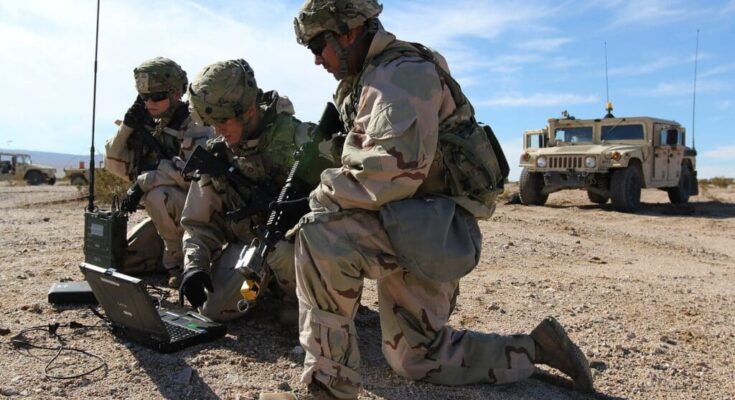
The pagers that exploded in the hands and pockets of Hezbollah members in Lebanon and Syria on Tuesday point to the involvement of the Israeli cyber warfare unit.
A Reuters report says that cyber warfare Unit 8200, the Israel Defense Forces’ intelligence unit, was involved in planning the operation, according to a Western source.
Meanwhile a senior Lebanese security source told Reuters that Israel’s Mossad intelligence agency was responsible for the operation of planting a small quantity of explosives within 5,000 pagers ordered by Hezbollah.
According to a New York Times report, the pagers that exploded were fitted with small quantities of explosive material—one or two ounces—placed next to the battery of the devices along with a switch that could be triggered remotely, US and other officials said on the condition of anonymity.
At least eleven people were killed, and an eight-year-old girl was among them. Furthermore, 2,700 were injured when at 3:30 p.m. Lebanon time, the pagers received a message that appeared to be coming from Hezbollah’s leadership, two of the officials said. Instead, the message activated the explosives.
The devices were programmed to beep for several seconds prior to exploding, according to three of the officials.
Hezbollah had ordered the pagers from Gold Apollo in Taiwan. However, the company said they were manufactured by BAC Consulting in Budapest under a license. BAC was not available to comment.
Earlier this year, Hezbollah’s leader, Hassan Nasrallah, prohibited the use of cellphones, as they were believed to be increasingly vulnerable to Israeli surveillance, according to certain officials and security experts.
Hezbollah has accused Israel of organizing the attack and pledged retaliation. However, Israel has not claimed responsibility nor commented on the issue.
Second day of beeper explosions
On Wednesday, there was a second wave of cyber attacks by Israel against Hezbollah operatives, Reuters reported.
This time, hand-held radios used by Hezbollah operatives detonated across Lebanon’s south. It was the country’s deadliest day since cross-border fighting erupted between the militants and Israeli forces after the October 7 attack of Hamas against Israeli civilians.
The new explosions spread fear across Lebanon with the country’s health ministry reporting 20 people dead and more than 450 injured in Beirut’s suburbs and the Bekaa Valley, Reuters reported. The death toll from Tuesday’s explosions rose to 12, including two children, with nearly 3,000 injured.
Security sources said Israel’s spy agency Mossad was responsible, with Israel not commentingt on the issue. One Hezbollah official told Reuters that the episode was the biggest security breach in the group’s history.
The new Israeli cyber warfare operations heightened fears of an escalation on its Lebanese border and the risk of a full-blown regional war.
“We are opening a new phase in the war. It requires courage, determination and perseverance from us,” Israeli Defense Minister Yoav Gallant said in remarks at an air force base, Reuters reports. The Israeli official did not mention the two days of explosions, but praised the IDF and the intelligence agencies calling the results “very impressive.”
A U.S. official, speaking on condition of anonymity, said Israel told Washington on Tuesday it was going to do something in Lebanon. Israel did not provide details and the operation itself was a surprise to Washington, the official said.
Israel’s 8200 cyber warfare unit
Israel has not commented on the operation against Hezbollah, but the spotlight is now on the IDF secretive 8200 cyber warfare unit.
According to Reuters, Special Unit 8200, which is known in Israel by its numbers in Hebrew “shmone matayim,” is part of the Israeli Military Intelligence Directorate. It is an
equivalent of the US National Security Agency and is the largest single military unit in the Israel Defense Forces.
Unit 8200 operations are highly secretive and range from signals intelligence to data mining and technological attacks and strikes.
According to Reuters, it has allegedly been involved in crucial operations, including the 2005-10 Stuxnet virus attack that disabled Iranian nuclear centrifuges, a 2017 cyber attack on Lebanon’s state telecoms company Ogero, and prevention of an ISIS attack on a civilian airliner traveling from Australia to the United Arab Emirates in 2018.
In 2023, the 8200 unit commanding officer told a conference in Tel Aviv that the unit has used artificial intelligence technology to help select Hamas targets, spying on Palestinians in the occupied West Bank and Gaza.
The unit operates in combat zones as well, and in wartime is integrated closely with combat command headquarters.
Unit 8200 personnel are selected from young individuals in their late teens and early 20s from highly competitive high school programs, many of whom have gone on to careers in Israel’s booming high tech and cyber security sector.
Former members say the unit operates like a startup with small teams working on problems with an unusual degree of freedom designed to foster creativity.



